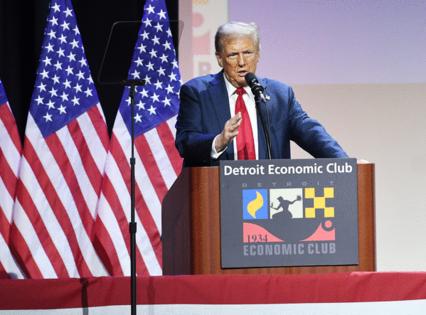Tyler Cowen: Trump's tariffs won't work, just as McKinley's didn't
Published in Op Eds
Donald Trump’s return to the White House means that one of his signature issues will soon return to the center of Washington’s economic policy agenda: tariffs. And while the evidence of their harm continues to grow, which is why economists like me oppose them, economists like me should also admit that tariffs probably matter less than we’d like to think.
Trump has promised to impose stiff tariffs of up to 60% on China, as well as lower tariffs on other trading partners, and some members of the conservative intelligentsia are cheering him on. They make several arguments, but at least one is increasingly tenuous: that 19th-century tariffs, which reached 35% in the 1890s, helped build the U.S. into an industrial power.
A new paper from the National Bureau of Economic Research shows that tariffs probably did more harm than good. Using meticulously collected industry-level and state-level data, the paper traces the impact of specific tariff rates more clearly than before. The results are not pretty.
One core finding is that industries with higher tariffs did not have higher productivity — in fact, they had lower productivity. Tariffs did raise the number of U.S. firms in a given sector, but they did so in part by protecting smaller, less productive firms. That was not the path by which the U.S. became an industrial giant, nor is it wise to use trade policy to keep lower-productivity firms in business. Not only does it slow economic growth, it also keeps workers in jobs without much of a future.
These results contradict the traditional protectionist story — that tariffs allow the best firms to grow larger and capture the large domestic market. In reality, the tariffs kept firms smaller and probably lowered U.S. manufacturing productivity.
The paper also finds that the tariffs of that era raised the prices for products released domestically. That lowers living standards, and should give a second Trump administration reason to pause, as he just won an election in which inflation was a major concern. The finding about inflation also counters another major protectionist argument: that tariffs eventually lower domestic prices because they allow U.S. firms to expand and enjoy economies of scale. That is the opposite of what happened.
The paper also details how lobbying, logrolling and political horse-trading were essential features of the shift toward higher U.S. tariffs. A lot of the tariffs of the time depended on which party controlled Congress, rather than economic rationality. Trump is fond of citing President William McKinley’s tariffs, but they are evidence of the primacy of political influence and rent-seeking, not of a well-thought out strategic trade policy.
No one should expect anything different today. Trump is notorious for playing political favorites in both rhetoric and policy. It is not unrealistic to expect that he will give more favorable tariff treatment to supportive businesses and sectors, and be less accommodating to his political enemies.
All this said, and while the prospect of higher tariffs is definitely unwelcome, I should also acknowledge that they may not do much to alter the longer-run path of the U.S. economy, much as McKinley’s tariffs did not. The core strengths of the U.S. remained intact, both during the tariff period and when tariffs were lowered.
This raises a broader question about how much any particular economic policy matters. In the 19th century, there were a lot of factors aside from tariffs driving the U.S. toward greater industrial success: a strong rule of law, abundant natural resources, an advanced educational system and a rapidly growing population. The factors differ today, but the U.S. economy remains a talent magnet, with commanding leads in sectors ranging from artificial intelligence to biomedicine to entertainment. Tariffs can slow down America’s progress, but they cannot destroy it.
Of course, defenders of Trump’s tariff proposals will question the results of this study. But they should not mistake residual uncertainty about this episode in U.S. history as an argument for protectionism. History is always uncertain, and the pro-tariff account of the protectionists was a just-so story in the first place, lacking firm causal proof. Their version of events has been subject to a systematic examination, and is now all the harder to take at face value.
As I said, we economists are sometimes guilty of overstating the impact of any particular economic policy. At the same time, the proponents of tariffs are guilty of understating the benefits of free trade.
_____
This column does not necessarily reflect the opinion of the editorial board or Bloomberg LP and its owners.
Tyler Cowen is a Bloomberg Opinion columnist, a professor of economics at George Mason University and host of the Marginal Revolution blog.
_____
©2024 Bloomberg L.P. Visit bloomberg.com/opinion. Distributed by Tribune Content Agency, LLC.




























































Comments